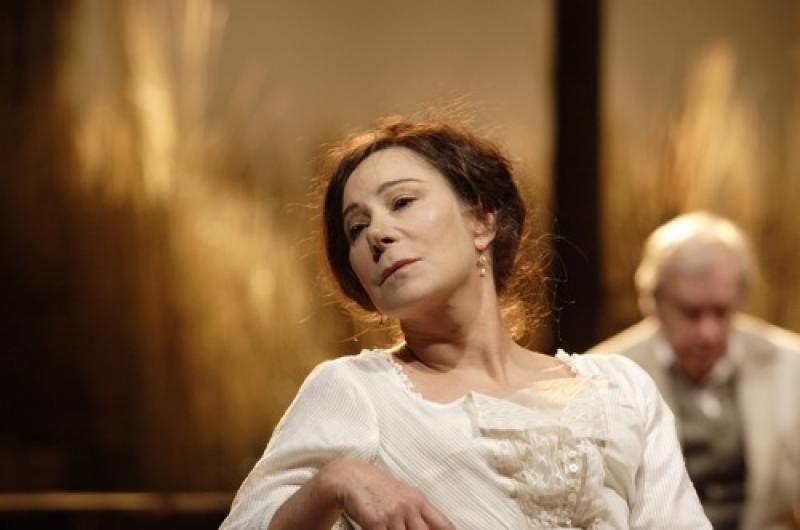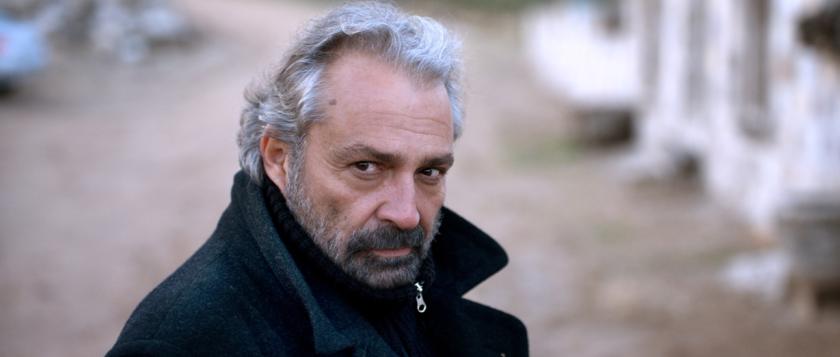This year’s Palme d’Or winner at Cannes, Turkish master Nuri Bilge Ceylan’s Winter Sleep (Kiş Uykusu), is a monumental film. Not merely in its scale – though at 196 minutes, it certainly clocks in on that front – but in its emotional heft.
It’s like one of the great Russian novels, and in his seventh feature Ceylan shows the influence of that country’s culture more strongly than ever (remember the direct references to Andrei Tarkovsky in the wintry Istanbul of Uzak, his first prize-winner at Cannes back in 2003?).
This time his script, as acknowledged in the film’s closing titles, is a loose adaptation of stories by Anton Chekhov, that master of unfulfilled emotions, the conflict of close relationships, and disillusion at life’s disappointments. There’s more than a hint of the Russian dramatist’s The Cherry Orchard too, not only in its loose theatrical structure, but in its provincial microcosm setting where nobody goes very far, while contemplating getting away to the capital – Istanbul in this case – or further still to Europe.
From these two long scenes with the women in his life, we reappraise the character of Ceylan’s hero
The film’s central location is a hotel in the spectacular visual surroundings of the troglodyte cliffs of Cappadocia (pictured below), a visual feast that takes in exotic rock formations and muddy roads, wild horses galloping freely, and later on blanketing snow. It’s the property of Aydin (Haluk Bilginer, main picture) – his name means “intellectual” in Turkish – and here he’s the “king of a small kingdom” who after a successful career as an actor has returned to his family estate to write a book, as well as weekly columns for the local newspaper. He lives there with his much younger wife Nihal (Melisa Sözen, pictured, bottom left), though their relations have clearly cooled, as well as his sister Necla (Demet Akbağ), who has spent part of her life in Europe, coming back home to recover from a divorce. It being the depths of winter, the hotel has few guests – some Japanese tourists, a roaming Turk on a motorbike – so it’s effectively a family home, administered over by Aydin’s steward, the long-suffering Hidayet (Ayberk Pekcan), who is also responsible for the rest of the estate property, including collecting rents from its tenants.
The film’s opening episode arises from that source, when a boy throws a stone at the window of the car in which Aydin and Hidayet are travelling: he’s the young son of the family of one such tenant who has got into debt. When the boy is brought home, hostility from the father very nearly turns to violence, only assuaged by the arrival of the latter’s brother, who is the local imam. The issue of who will pay for the broken window provides the basis for the drama of the opening third of the film, but Winter Sleep is more concerned with the internal relations between its central three protagonists. They have a small circle of local acquaintances who drop in from time to time, including for meetings of a local charity committee that Nihal coordinates to give some meaning to her life. Her involvement in that makes for a long and hugely powerful middle act of confrontation between husband and wife (no wonder that Ceylan has cited Bergman among the directors he is closest to).
The issue of who will pay for the broken window provides the basis for the drama of the opening third of the film, but Winter Sleep is more concerned with the internal relations between its central three protagonists. They have a small circle of local acquaintances who drop in from time to time, including for meetings of a local charity committee that Nihal coordinates to give some meaning to her life. Her involvement in that makes for a long and hugely powerful middle act of confrontation between husband and wife (no wonder that Ceylan has cited Bergman among the directors he is closest to).
While Aydin and his wife are virtually estranged, Necla drops into her brother’s study whenever she wants, and they have long discussions there, including another momentous argument (the words are plentiful in this script, co-written by the director and his wife Ebru). From these two long scenes with the women in his life, we reappraise the character of Ceylan’s hero: rather than the well-meaning if distracted intellectual and landlord, we come to understand from the insights of his wife and sister the depths of his self-centredness, how much underneath he loves only himself. Aydin becomes a positively Tolstoyan figure – early scenes show the trio having breakfast discussions about the philosophical merits of not resisting evil which could have come straight from Yasnaya Polyana – both in his relations with his wife, and his sense of being seigneur in his world, but in his selfishness too.
Aydin becomes a positively Tolstoyan figure – early scenes show the trio having breakfast discussions about the philosophical merits of not resisting evil which could have come straight from Yasnaya Polyana – both in his relations with his wife, and his sense of being seigneur in his world, but in his selfishness too.
The final third of Winter Sleep begins with the kind of abrupt departure that we know from the real life of Tolstoy’s final days, while I’d wager much that Ceylan is at least alluding to that writer’s Master and Man (reprised recently in Bernard Rose’s Boxing Day), a story of a difficult snow journey shared by lord and servant. Aydin’s real journey, however, has been an internal one, but whether he has reached his destination – will there be a spring to follow his winter? – is a question that Ceylan leaves tantalisingly open.
The director has assimilated Russian literature deeply, and brought its essence into his contemporary Turkish world. There’s a lovely late scene in which Aydin, an old friend and the village teacher sit around drinking (the only appearance of alcohol in the film) and talking, veering on confrontation, that's straight out of Chekhov; the next day, as if in Turgenev, they set off across the snowy wastes to go hunting. Another late scene, less convincing, sees Nihal trying to make atonement, and surely has that other titan of Russian 19th-century prose Dostoyevsky in mind; it’s unsatisfactory because the denouement of the episode is surely guessable from its beginning, which you can’t say of the rest of Winter Sleep.
Ceylan has drawn superb performances from his cast. The glorious landscapes are beautifully shot in widescreen by cinematographer Gökhan Tiryaki, with details of interiors caught no less well by production designer Gamze Kuş. The plaintive refrains of a Schubert sonata resonate languidly throughout the film, reminding us at once of life’s sadness and of its beauty. Winter Sleepis a masterpiece, and one that wears its length lightly.
MORE CHEKHOV ON THEARTSDESK
The Cherry Orchard, National Theatre (2011). Zoë Wanamaker (pictured below) shines in Howard Davies's murky production of Chekhov
The Cherry Orchard, Sovremennik, Noël Coward Theatre (2011). Russians soar in third, and final, offering of their first-ever London season
Uncle Vanya, The Print Room (2012). Iain Glen stars in a version of Chekhov at his most tenderly intimate
A Provincial Life, National Theatre Wales (2012). Moments of visual beauty punctuate a Chekhov adaptation that struggles to find its focus
Three Sisters, Young Vic (2012) Benedict Andrews' energetic update is stronger on ensemble work than individual performances
 Uncle Vanya, Vakhtangov Theatre Company (2012). Anti-naturalistic Russian Chekhov buries humanity under burlesque and mannerism
Uncle Vanya, Vakhtangov Theatre Company (2012). Anti-naturalistic Russian Chekhov buries humanity under burlesque and mannerism
Uncle Vanya, Vaudeville Theatre. Anna Friel, Laura Carmichael and Ken Stott shine bright in Lindsay Posner's production of Chekhov's drama
Longing, Hampstead Theatre (2013). William Boyd's dramatisation of two Chekhov stories with Iain Glen and Tamsin Greig is more pleasant than towering
The Cherry Orchard, Young Vic (2014). Katie Mitchell delivers Chekhov's masterpiece with devastating power
Uncle Vanya/Three Sisters, Wyndham's Theatre (2014). Quiet truth in finely observed ensemble Chekhov from the Mossovet State Academic Theatre
The Seagull, Regent's Park Open Air Theatre (2015). Strikingly staged Chekhov continues a strong season in the park
Uncle Vanya, Almeida Theatre (2016). Robert Icke's lengthy Chekhov revival/reappraisal is largely a knockout
Young Chekhov, National Theatre (2016). Jonathan Kent's three-play Chekhovathon builds to a shattering climax
Wild Honey, Hampstead Theatre (2016). Early Chekhov begins strongly then falls away















Add comment